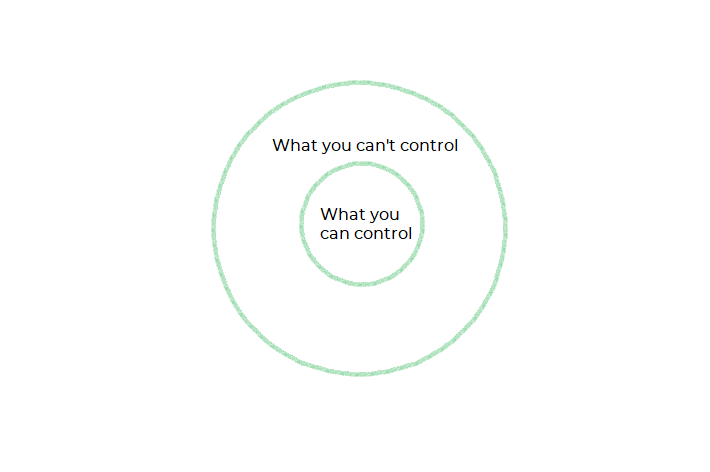
The chief task in life is simply this: to identify and separate matters so that I can say clearly to myself which are externals not under my control, and which have to do with the choices I actually control. Where, then, do I look for good and evil? Not to uncontrollable externals, but within myself to the choices that are my own . . .
— Epictetus, Discourses, 2.5.4–5
A year ago I was offered to sell my startup. The deal was lucrative and involved taking over as the CEO of another, significantly more profitable scaleup. I asked for money to compensate for the time our founders would spend on the negotiations. Asking for money meant I didn’t understand the opportunity, they said, so they pulled out. This seemed stupid, but, just like that, the deal was off.
I couldn’t forgive myself. How could I be so stupid? Would I have been a millionaire within days if I hadn’t asked for compensation? I couldn’t stop grilling myself. The only thing that helped was understanding that I couldn’t change a thing anymore. What happened, happened. The psychological frameworks described in this article brought me to this insight and allowed me to apply it to other areas of my life.
The dark side of confidence

Locus of control is a psychological term referring to the degree to which you believe that you have control over the outcomes of events in your life.
The event I described above illustrates the toxic internal locus of control that many high achievers and entrepreneurs suffer from. Having an internal locus of control means that you are responsible for everything in your life. The benefit of having an internal locus of control is high self-confidence. There is a price too: feeling responsible for things that are not up to you.
My partner recently noticed that I compare myself to the best of the best entrepreneurs and consider us equals. Yes, I am educated, rich enough to live in a Western country, and healthy. Yet I disregard other factors, such as that I grew up in Ukraine, live in a foreign country, and wasn’t born into wealth. Believing to be equal with the best of the best is a double-edged sword that enables self-confidence but also puts insurmountable pressure and expectations on me at times.
The blind spot of not seeing other options

External locus of control refers to the opposite, namely seeing oneself as a victim of circumstance. If you think that it doesn’t apply to you, let me try to convince you using my own example.
The story I told at the beginning of the article didn’t end there. The company that pulled out of the deal found another startup to acquire. As with us, they were only interested in the founders. They then came back to us and offered to take over that startup and its technology.
I brought along a friend, our future CTO, to study their technology. By some coincidence, it was exactly what we were missing. My startup was working on making business coaching accessible to anyone. We were testing the business model at first, starting by doing coaching via text, manually. The first tests were successful and we were considering developing the technology soon. The startup we were offered to acquire had exactly that, the chatbot coaching technology. While it seemed like a match made in heaven, the price was steep.
For some time I thought we had no choice but to pay. We needed what they had. Having no choice is the first sign of getting into the victim mentality. Our future CTO was the one to get me out of that illusion. “I can develop the same thing in 3 to 6 months,” he said. For some reason, the option never even occurred to me. Sometimes, even entrepreneurs get tunnel vision. We said “no” to the deal and developed the Chatbot Coach internally.
Spheres of influence

Here is a small exercise for you that is useful to do whenever faced with a difficult situation. Draw 2 circles, a small one inside a big one. Within the inner circle, write down things you CAN directly influence. Within the outer circle, write down things you CANNOT directly influence. Reflect on your internal narrative — is the inner or outer circle more present?
Is there a tendency for unreasonable self-blame and personalization? That might mean you have a toxic internal locus of control.
Is there a tendency for self-victimizing and blaming others and/or external conditions when things don’t go as planned? That might mean you have a toxic external locus of control.
If you have a realistic attribution of both internal and external causes, you are likely to have a healthy internal locus of control.
Helpful tools:
- Check out “cognitive distortions”, a concept developed by Aaron Beck & David Burns. It is especially helpful to decrease blaming, taking things personally, black and white thinking, and fallacies related to believing that you can’t influence anything.
- The book “Meditations” by Marcus Aurelius or other Stoic works.
- The book “Guide to Rational Living” by Albert Ellis.
- The psychological literature on the locus of control.
To be continued: 11 more mental models
In the following articles, I will explore other mental models that will help you to work smarter, be more productive, and stay mentally healthy. If you are like me and need a nudge to apply what you learned in practice, give our Chatbot Coach a shot, it’s free to try.
__________
Photo: Stephen Kraakmo